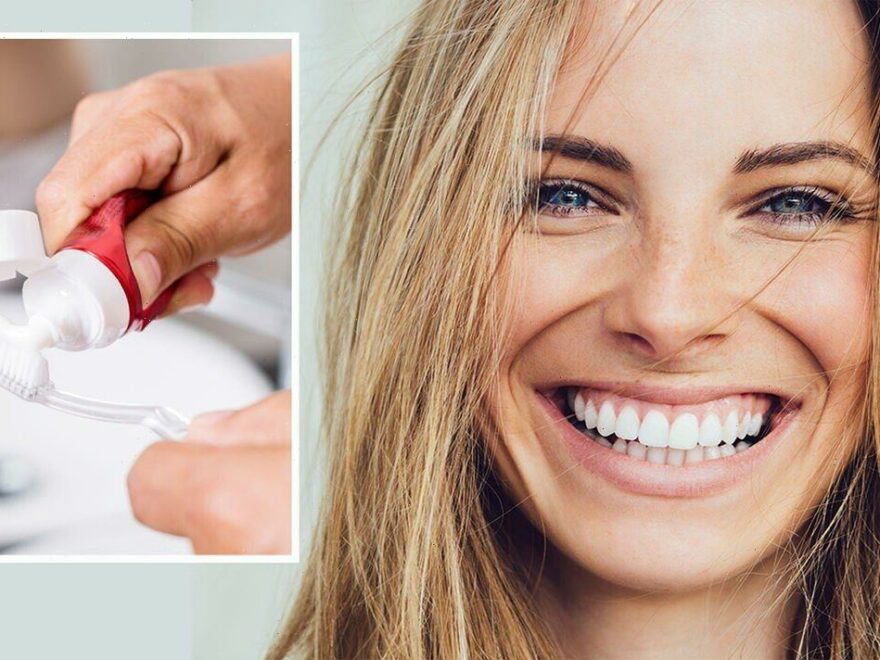Dr Alex George reveals best time to brush your teeth
We use your sign-up to provide content in ways you’ve consented to and to improve our understanding of you. This may include adverts from us and 3rd parties based on our understanding. You can unsubscribe at any time. More info
Everyone wants to get whiter, brighter teeth and not pay hundreds of pounds to sit in a dentist’s chair. But did you know using teeth-whitening toothpaste can do more harm than good? Express.co.uk spoke to Dr Sahil Patel, Cosmetic Dentist & Founder of Marylebone Smile Clinic.
Speaking about the best at-home products which can whiten teeth, Dr Sahil said: “There are lots of at-home products that claim to report to whiten teeth, however, almost all of them do not have a strong research base clarifying whether they are effective or indeed safe.
“Many of the major brands that can whiten teeth over one session are likely too good to be true, and the effects are often short lived.
“That being said, there is one that can be bought without seeing a dentist which uses a mild bleach called PAP which is a shorthand for a new form of bleach that is not subject to the restrictions that peroxide is, in the EU and in the UK.
“This has shown some short term benefits to whitening teeth, however, research is still occurring of the long term effects and safety.
“Would I recommend it? I think it is not going to cause any harm to you, but your gold standard is going to be to see a dentist to have tooth whitening,” he added.

Broadly speaking there are three to four types of toothpaste available: fluoridated, sensitive (also fluoridated), whitening and non-fluoridated.
Marylebone Smile Clinic recommends “using the first two – fluoridated or sensitive toothpastes to maintain good teeth”.
“These are protective and not too abrasive like the whitening or smoker’s toothpastes.
“Avoid non-fluoridated toothpastes at all costs,” the dentist commented.
“There is only one or two active ingredients in toothpastes – that’s fluoride.
“Toothpaste tabs follow the same principles as above, but they are delivered in a different form.”
When asked why whitening toothpaste are not recommended, Dr Sahil explained: “Whitening toothpaste typically contain a higher level of abrasive, which is how it gives the whitening effect, by stripping off a very thin layer of enamel on the top surface of your teeth.
“Initially this can sound promising because it will give you a result, however the enamel is only half a millimetre to one millimetre thick, and needs to last you a lifetime.
“If you are trying to whiten your teeth by stripping off a layer, it would not be sustainable long term and you may end up with severe problems later.
“This includes sensitivity, your teeth could get even yellower as a result of loosing the enamel and needing more dental work later in life.
View this post on Instagram
A post shared by Marylebone Smile Clinic (@marylebonesmileclinicuk)
“Fluoridated and sensitive toothpaste are superior as they impart the protective effects of fluoride and are not overly abrasive,” he said.
Anyone looking to make their teeth whiter, Dr Sahil suggests visiting their dentist.
At Marylebone Smile Clinic, “there are a couple of ways” to whiten teeth.
“The first one is to use custom-made trays which sit over your teeth for one hour, per day, over a period of two to four weeks, or more,” the expert revealed.
“The slightly better approach is to use the whitening trays at night-time overnight for two to four weeks.
“This exposes the teeth to a certain concentration of peroxide that whitens the teeth and you can essentially get whiter teeth in this way.

“The cost of the treatment like this varies from clinic to clinic, but in London, it might range from £295-£695.
“Typically you see the initial whitening happening over the first three days.
“After the third to tenth day, the effect increases and from the tenth to the fourteenth day it stabilises and plateaus and it is important to continue to the fourteenth day to give yourself stability long term.”
Dr Sahil continued: “Composite bonding and porcelain veneers are reserved for those who cannot whiten, or would like to get their teeth to a brighter shade than what is achievable with peroxide whitening alone.
“Composite bonding is proved at £295/tooth and porcelain is £795/tooth.
“Both of these are permanent, and last six to eight years and 10-15 years respectively.”
Source: Read Full Article
